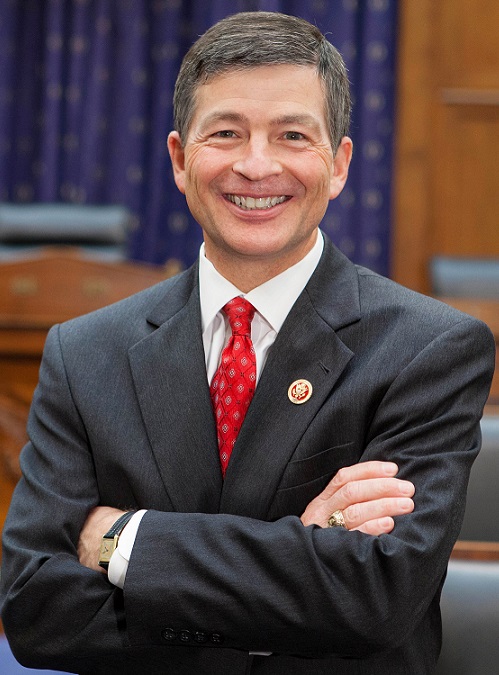House Financial Services Committee Chairman Jeb Hensarling(R-Texas) made an 11th-hour pitch to persuade NCUAChairman Debbie Matz to delay finalizing the risk-based capitalrule.
|The plea came in the form of a strongly-worded letter Tuesday.TheNCUA board will vote on the final rule during its Thursdayboard meeting at NCUA headquartered in Alexandria, Va.
|| Hensarling(pictured at left) referenced his committee's Sept. 30 approval ofH.R. 2769, the Risk-Based Capital Study Act, which wouldrequire the NCUA to review its risk-based capital rule and report back to Congress the impactthe rule would have on credit unions and their members. It wouldalso require the NCUA to conduct additional research regardingwhether or not it has the legal authority to finalize and enforceRBC2.
Hensarling(pictured at left) referenced his committee's Sept. 30 approval ofH.R. 2769, the Risk-Based Capital Study Act, which wouldrequire the NCUA to review its risk-based capital rule and report back to Congress the impactthe rule would have on credit unions and their members. It wouldalso require the NCUA to conduct additional research regardingwhether or not it has the legal authority to finalize and enforceRBC2.
The sponsors of that bill, Reps. Stephen Fincher (R-Tenn.), BillPosey (R-Fla.) and Denny Heck (D-Wash.), followed the bill'scommittee passage with an Oct. 6 letter to Matz, asking her tovoluntarilyconduct the study prior to finalizing the rule.
|Matz responded Oct. 8, telling the congressmen she would reportthe requested study results to Congress after the rule wasfinalized.
|“It is deeply troubling that you would utterly disregard theexpress will of this committee and rush to adopt a misguided rulethat risks undermining the safety and soundness of credit unions ina contravention of the NCUA's statutory mandate,” Hensarlingwrote.
|The committee chairman urged Matz comply with the requirementsof the proposed law before finalizing the rule, and furtherrequested that his letter be read into the record during Thursday'sNCUA board meeting.
|In response, NCUA Public Affairs Specialist John Fairbanksacknowledged that the NCUA received Hensarling's letter and wouldreview it carefully.
|“(The) NCUA has crafted the proposed risk-based capital rule inorder to comply with current federal law and to protect the safetyand soundness of the credit union system,” he said in astatement.
|Hensarling also referenced an Oct. 2 letterfrom Matz to Senate Banking Committee Chairman Richard Shelby(R-Ala.) and Ranking Member Sherrod Brown (D-Ohio), requesting thecommittee adopt the NCUA's proposal to gain third-party vendorauthority.
|“I also find it troubling, though not surprising, that at thesame time you have chosen to disregard the clear wishes ofCongress, you are also seeking vast new regulatory authority for(the) NCUA, as evidenced by your Oct. 2 letter requesting that theagency be granted direct oversight of all third-party vendors doingbusiness with credit unions. Under the circumstances, (the) NCUAhas not demonstrated that it can be entrusted to exercise suchbroad new authority responsibly,” Hensarling wrote.
|On Aug. 4, Sen. Elizabeth Warren (D-Mass.), a member of theSenate Banking Committee, proposed an amendment to S. 754, the Cybersecurity InformationSharing Act of 2015, that would grant the NCUA authority toregulate and examine third-party vendors who provide services tocredit unions. That amendment was not approved.
|In her letter to Shelby and Brown, Matz wrote that the NCUA'slack of third-party oversight presented an ever-increasingregulatory blind spot for the agency, especially as it relates tocybersecurity. The NCUA was granted temporary vendor authority toaddress Y2K issues; the FDIC, Federal Reserve and OCC retained thatauthority after 2000.
|“Credit unions are increasingly using third-party vendors toprovide technological services, including for security services,and there is a greater interconnectedness among vendors,” Matzwrote. “Simultaneously, the number and sophistication of hackers,criminals and cyberterrorists seeking to exploit vulnerabilities inthese networks and systems continues to grow. Without the tools andauthorities that other federal financial institutions regulatorshave at their disposal, (the) NCUA may not have the capability toaddress this growing threat.”
|Read Matz' letter on third-party vendor authority here.
|Matz also referenced Government AccountabilityOffice and Federal Stability Oversight Council recommendationsearlier this year that recommended Congress adopt regulation thatwould provide third-party vendor authority.
|The NCUA chairman also took aim at CUSOs, writing that since2008, the NCUA estimated that nine CUSOs have caused more than $300million in direct losses to the NCUSIF.
|“The potential risk to the credit union system is significantgiven the interconnectedness of the credit union system and creditunions' common use of vendors and CUSOs for services,” Matz wrote.For example, the top four credit union core processing vendorsserve over 53% of federally insured credit unions representing 84%of total system assets. Unresolved problems within a key technologyservice provider, the failure of a key technology service provider,or both, could result in losses to credit unions and, in turn, theshare insurance fund.”
|Matz also advocated for two additional authorities: Statutorychanges to the Central Liquidity Facility and expanded access tothe U.S. Treasury to ensure sufficient emergency liquidity, and theauthority to charge NCUSIF risk-based premiums as the FDIC does forits deposit insurance fund.
|“Risk-based premiums would lessen the funding burden on smallcredit unions, which generally pose less risk to the shareinsurance fund. The proposed legislation also would provide (the)NCUA with greater flexibility in managing the share insurancefund's equity ratio,” she wrote.
Complete your profile to continue reading and get FREE access to CUTimes.com, part of your ALM digital membership.
Your access to unlimited CUTimes.com content isn’t changing.
Once you are an ALM digital member, you’ll receive:
- Critical CUTimes.com information including comprehensive product and service provider listings via the Marketplace Directory, CU Careers, resources from industry leaders, webcasts, and breaking news, analysis and more with our informative Newsletters.
- Exclusive discounts on ALM and CU Times events.
- Access to other award-winning ALM websites including Law.com and GlobeSt.com.
Already have an account? Sign In
© 2024 ALM Global, LLC, All Rights Reserved. Request academic re-use from www.copyright.com. All other uses, submit a request to [email protected]. For more information visit Asset & Logo Licensing.








